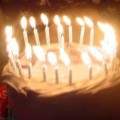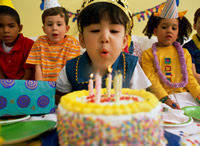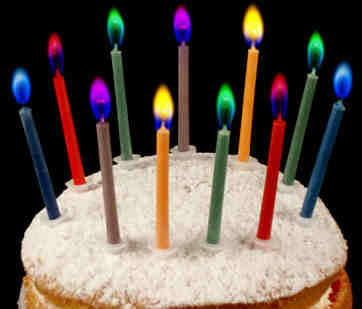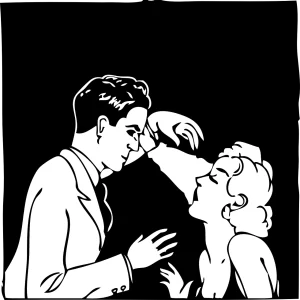The Origins & History of Birthday Parties, Celebrations & Traditions with Biblical References

The Origins & History of Birthday Parties, Celebrations & Traditions with Biblical References
I made this video in 2011, some information in this video I no longer believe, but the birthday information is still accurate and I did a good job on it so I am keeping it up.
THE ORIGINS OF BIRTHDAYS
Birthdays have an ancient origin stemming from magic and paganism, similar to the origins of Christmas and Halloween. This belief in spirits is the reason for many, if not all, of the traditional birthday customs that are practiced today. It was feared that evil spirits were particularly attracted to people on their birthdays. To protect them from harm, friends and family would to come be with the birthday person and bring good thoughts and wishes. Giving gifts brought even more good cheer to ward off the evil spirits. This is how birthday parties began.

Some scholars believe that cake in the ancient world has association with the annual cycles. Round shapes of cakes were preferred as these represented the cyclical nature of life. Most specifically, the sun and moon.

THE ORIGINS OF BIRTHDAY CANDLES
In ancient times, people prayed over the flames of an open fire. They believed that the smoke carried their thoughts up to the gods. Scholars also say that the custom of placing candles originated because people believed that Gods lived in the skies. They thought that lit candle helped to send signals and prayers to their god so that it could be answered more effectively. The other belief that people held was when a person makes a wish while blowing out the candle a signal or message was received by their god and the prayers would be answered.
The tradition of placing candles on Birthday cake is attributed to early Greeks, who place lit candles on cakes to make them glow like the moon. Greeks used to take the cake to the temple of Artemis-the Goddess of Moon.
In present times too, people place candles on Birthday cakes and a silent wish is made before blowing out the candle. It is believed that blowing out all candles in one breath means the wish will come true and the person with enjoy good luck in the coming year.
Birthday celebrations and self worshipping
It is a day in which the celebration centers completely around the birthday person; as the recipient of gifts, parties, and well-wishings, it is difficult to believe that this seemingly innocent celebration has its origins in ancient mystic beliefs.
NAOMI CAMPBELL & HER SELF WORSHIPING CELEBRATIONS:
Supermodel Naomi Campbell celebrated her 36th birthday by living it up at the world’s first & only 7 star hotel, & rented out all 18 floors for three days. Her total cost- $1.8 million. This birthday celebration lasted 72 hours along with a star-studded guest list and her millionaire boyfriend. What made this party was the fact that it had different themes for every night (all white, samba, hip hop).
PARIS HILTON & HER SELF WORSHIPING CELEBRATIONS
One single party wouldn’t be enough for this party girl so she organized a few of them in New York, Los Angeles, Las Vegas, Tokyo and London. She paid ($75,000 per guest) ensuring that they have a great time on her 21st birthday.
Birthday Superstitions
THERE ARE MANY BIRTHDAY SUPERSTITIONS
such as saying “happy birthday” to friends and loved ones was society’s superstitious way of protecting them from evil spirits.
Birthday thumps, bumps, pinches, etc., were said to bring luck and send away evil spirits.
Party snappers, horns and other noisemakers were also intended to scare off bad-luck spirits.
Blowing out all candles in one breath means the wish will come true and the person with enjoy good luck in the coming year.
Some also smear out the name of the person before slicing of the cake to bring good luck.
If the cake fell while baking it was considered to be a bad omen and signified bad luck for the person in the coming year.
Other birthday traditions, such as surrounding the birthday person, the singing of the happy birthday song, and even playing such birthday games as “Pin-The-Tail-On-The-Donkey” were all associated with warding off evil spirits, guessing the future, and magic.
THE ORIGINS OF BIRTH DATES
Birthday celebrations are common to the Western culture; however, the origins of this yearly celebration was always linked to mysticism and astrology. The practice of celebrating one’s birth in ancient times did not exist.
The introduction of the Egyptian calendar became linked to astrology and fortune-telling. The keeping of birthdays, then, was important in ancient times, essentially due to the fact that the date of one’s birth was directly related to the casting of a person’s horoscope.
In early civilizations, it was believed that “the horoscopes of ruling monarchs, their successors and rivals had to be cast with care and birthday omens meticulously examined”, because the prognostications of kings and those of royalty affected the entire society.
Pharoahs of ancient Egypt gave feasts for their birthdays. In ancient Rome, the emperor gave huge parties in honor of his own birthday, which included parades, circuses, and gladiatorial combat. The celebration of days was so important to the average Roman citizen that the Roman calendar designated a majority of days for some form of celebration—including many birthdays of gods and famous men.
QUICK HISTORY of YAH’S PEOPLE CONCERNING BIRTHDAY CELEBRATIONS
The custom of celebrating one’s birth was considered a pagan practice during the first and second centuries A.D. Because astrology was closely linked with the date of one’s birth, many early church fathers rejected the notion of honoring birthdays because astrology was condemned in the bible (Isaiah 47:13)
After the fourth century, celebrating one’s birth became a common practice, due largely in part to the Romans, who having practiced this custom for thousands of years, began to embrace Christianity.
What does the bible say about birthday parties & celebrations?
Deuteronomy 18:9
When thou art come into the land which יהוה thy Elohim giveth thee, thou shalt not learn to do after the abominations of those nations.
10 There shall not be found among you any one that maketh his son or his daughter to pass through the fire, or that useth divination, or an observer of times, or an enchanter, or a witch.
11 Or a charmer, or a consulter with familiar spirits, or a wizard, or a necromancer.
12 For all that do these things are an abomination unto יהוה: and because of these abominations יהוה thy Elohim doth drive them out from before thee.
13 Thou shalt be perfect with יהוה thy Elohim.
14 For these nations, which thou shalt possess, hearkened unto observers of times, and unto diviners: but as for thee, יהוה thy Elohim hath not suffered thee so to do.
Isaiah 47:13-14
You are wearied in the multitude of your counsels; Let now the astrologers, the stargazers, And the monthly prognosticators Stand up and save you From what shall come upon you. Behold, they shall be as stubble, The fire shall burn them; They shall not deliver themselves From the power of the flame.
The word Birthday is mentioned 2x’s in the Bible.
On both occasion, it was a Gentile celebration in which an negative event occurred.
PHARAOH’S BIRTHDAY CELEBRATION…
Genesis 40:20-22
Now it came to pass on the third day, which was Pharaoh’s birthday, that he made a feast for all his servants; and he lifted up the head of the chief butler and of the chief baker among his servants. Then he restored the chief butler to his butlership again, and he placed the cup in Pharaoh’s hand. But he hanged the chief baker.
HEROD’S BIRTHDAY CELEBRATION…
Matthew 14:
3 For Herod had laid hold on John, and bound him, and put him in prison for Herodias’ sake, his brother Philip’s wife.
4 For John said unto him, It is not lawful for thee to have her.
5 And when he would have put him to death, he feared the multitude, because they counted him as a prophet.6 But when Herod’s birthday was kept, the daughter of Herodias danced before them, and pleased Herod.
7 Whereupon he promised with an oath to give her whatsoever she would ask.
8 And she, being before instructed of her mother, said, Give me here John Baptist’s head in a charger.
9 And the king was sorry: nevertheless for the oath’s sake, and them which sat with him at meat, he commanded it to be given her.
10 And he sent, and beheaded John in the prison.11 And his head was brought in a charger, and given to the damsel: and she brought it to her mother.12 And his disciples came, and took up the body, and buried it, and went and told Yahushua .
Jeremiah 10:1
Hear ye the word which יהוה speaketh unto you, O house of Israel:
2 Thus saith יהוה, Learn not the way of the heathen, and be not dismayed at the signs of heaven; for the heathen are dismayed at them.
3 For the customs of the people are vain:
Ecclesiastes 7:1
A good name is better than precious ointment, and the day of death than the day of one’s birth.
HEAR FROM THE EXPERTS…
Flavius Josephus, a first-century Hebrew historian, says this regarding birthdays: “Nay, indeed, the law does not permit us to make festivals at the births of our children.” (Flavius Josephus, Against Apion, Book 2, Section 25).
Comments from the Catholic Church as well as many of the early church fathers establishes the fact that many Christians objected to the celebration of birthdays. Origen of Alexandria, an early theologian of the Christian church, wrote in 245 A.D.: “none of the saints can be found who ever held a feast or a banquet upon his birthday, or rejoiced on the day when his son or daughter was born.” (Catholic Encyclopedia, 2003). Origen also asserted that it was sinners alone, and not saints, who celebrated their birthdays.
According to M’Clintock and Strong’s Cyclopedia, “The Jews and early Christians regarded birthday celebrations as part of idolatrous worship.” (Vol. 1, p. 817).
CONCLUSION:
We do not honor Yahuah by celebrating birthday’s. It was never a custom to celebrate the birth of anyone.
Celebrating Birthdays was a learned customs of the Pagans, which יהוה forbad us to follow…Learn not the ways of the Nations
Total Views: 1556








